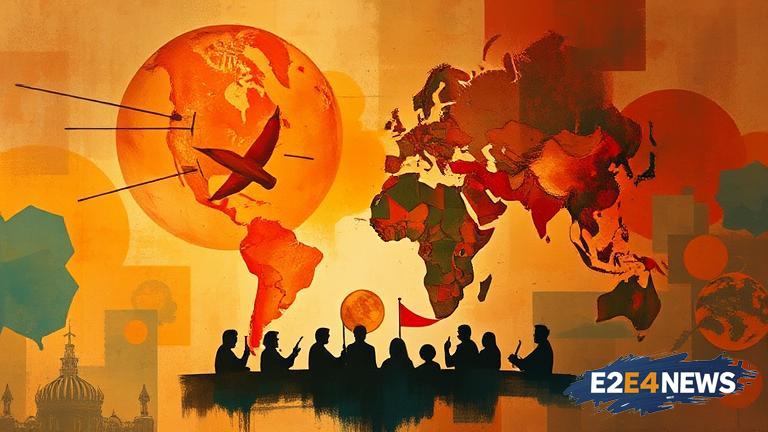The role of religion in geopolitics is a complex and multifaceted issue that has been debated by scholars and policymakers for centuries. In recent years, the intersection of faith and global politics has become increasingly important, as religious ideologies and interests have begun to shape international relations and global conflicts. One of the primary ways in which religion influences geopolitics is through the promotion of cultural and moral values. Many religions have a strong sense of moral purpose and a desire to promote their values and beliefs to others. This can lead to conflicts between different religious groups, as well as between religious and secular groups. For example, the rise of Islamist extremism has led to conflicts in the Middle East and beyond, while the promotion of Christian values has led to tensions between the United States and other countries. Another way in which religion influences geopolitics is through the creation of alliances and coalitions. Religious groups often form alliances with other groups that share their values and interests, which can lead to the creation of powerful coalitions that can shape international relations. For instance, the alliance between the United States and Israel is partly driven by shared religious values, while the alliance between Russia and the Orthodox Church has helped to promote Russian interests in Eastern Europe. Religion also plays a significant role in shaping public opinion and influencing political decision-making. Many politicians use religious rhetoric to mobilize support for their policies, while others use religious values to justify their actions. For example, the use of religious language by former US President George W. Bush helped to mobilize support for the invasion of Iraq, while the use of Islamic rhetoric by Iranian leaders has helped to justify their country’s nuclear program. Furthermore, religion can also be used as a tool of soft power, with countries using their religious influence to promote their interests and values abroad. For instance, the spread of Islamic education and culture has helped to promote Saudi Arabian influence in the Middle East, while the promotion of Buddhist values has helped to promote Chinese influence in Southeast Asia. However, the intersection of faith and global politics is not without its challenges. The rise of religious extremism has led to increased tensions and conflicts, while the use of religious rhetoric has often been used to justify violence and discrimination. Additionally, the promotion of religious values can also lead to the suppression of minority rights and the restriction of individual freedoms. To navigate these challenges, it is essential to understand the complex relationship between faith and global politics. This requires a nuanced understanding of the different ways in which religion influences geopolitics, as well as a commitment to promoting tolerance, understanding, and cooperation between different religious groups. By working together, we can promote a more peaceful and stable world, where the intersection of faith and global politics is a source of strength and unity, rather than conflict and division. The relationship between faith and global politics is also influenced by historical and cultural factors. For example, the legacy of colonialism and imperialism has shaped the relationship between Western and non-Western countries, with many non-Western countries viewing Western powers as seeking to impose their values and beliefs on others. Similarly, the cultural and historical context of different regions has shaped the way in which religion is practiced and understood. For instance, the practice of Islam in the Middle East is shaped by the region’s unique cultural and historical context, while the practice of Christianity in Europe is shaped by the region’s own unique cultural and historical context. In conclusion, the intersection of faith and global politics is a complex and multifaceted issue that requires a nuanced understanding of the different ways in which religion influences geopolitics. By promoting tolerance, understanding, and cooperation between different religious groups, we can work towards a more peaceful and stable world, where the intersection of faith and global politics is a source of strength and unity, rather than conflict and division. The role of religion in geopolitics will continue to evolve in the coming years, with new challenges and opportunities emerging as the world becomes increasingly interconnected. As we move forward, it is essential that we prioritize dialogue, cooperation, and mutual understanding, and work towards a world where the intersection of faith and global politics is a source of peace, stability, and prosperity for all. The impact of religion on geopolitics can also be seen in the way it shapes international relations and global governance. For example, the United Nations has recognized the importance of religion in promoting peace and stability, and has established a number of initiatives aimed at promoting interfaith dialogue and cooperation. Similarly, the European Union has recognized the importance of religion in shaping European identity and values, and has established a number of initiatives aimed at promoting interfaith dialogue and cooperation. In addition, the role of religion in geopolitics is also influenced by economic factors, with many countries seeking to promote their economic interests through religious diplomacy. For instance, the promotion of Islamic finance has helped to promote economic cooperation between Muslim-majority countries, while the promotion of Christian values has helped to promote economic cooperation between Western countries. Overall, the intersection of faith and global politics is a complex and multifaceted issue that requires a nuanced understanding of the different ways in which religion influences geopolitics. By promoting tolerance, understanding, and cooperation between different religious groups, we can work towards a more peaceful and stable world, where the intersection of faith and global politics is a source of strength and unity, rather than conflict and division.
